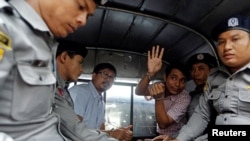A judge in Myanmar ruled Monday that two journalists for the Reuters news agency will face trial for allegedly breaking the country's secrecy laws by reporting on the Rohingya crisis. The ruling comes after months of preliminary hearings.
Wa Lone, 32, and Kyaw Soe Oo, 28, are accused of breaching the Official Secrets Act, which carries a maximum penalty of 14 years in prison.
"We are deeply disappointed that the court declined to end this protracted and baseless proceeding against Wa Lone and Kyaw Soe Oo. These Reuters journalists were doing their jobs in an independent and impartial way, and there are no facts or evidence to suggest that they've done anything wrong or broken any law," Reuters president and editor-in-chief Stephen Adler said in a statement.
The pair has been held in custody since their arrest in December and are accused of being in possession of leaked sensitive material linked to a military crackdown in crisis-hit Rakhine state, home to Myanmar's minority Muslim Rohingya population.
"We did not commit any crimes,'' Wa Lone told journalists outside the courtroom after the ruling. "Today's court decision does not mean that we are guilty. We still have the right to a defense."
The reporters were meeting with two police officers they said they had never met before in northern Yangon. The men later told relatives that they were handed some papers, then were arrested almost immediately.
Their detention has prompted an outcry among international human rights groups.
Adler said that Monday's court decision "casts serious doubt on Myanmar's commitment to press freedom and the rule of law."
The United Nations expressed concern at the "arrest and continued detention" of the journalists. "The secretary-general has repeatedly urged for the release of the journalists and for the authorities to respect the right to freedom of expression and information," U.N. spokesman Stephane Dujarric said.
U.S. ambassador to the U.N., Nikki Haley, called on "the Burmese government to allow these journalists to return to their families and continue their work.''
"Today's action is a clear indication of the significant backsliding on human rights we've seen in Myanmar since the 2015 election," Human Rights Watch said.
More than 700,000 Rohingya have fled Myanmar's northern Rakhine state since August, after attacks by Rohingya militants against state security forces led to military reprisals. The U.N. said the military retaliated in a well-organized, systematic and coordinated manner, a "textbook example" of ethnic cleansing.
Fleeing Rohingya have told harrowing accounts of the military burning their villages in northern Rakhine state, and of rapes, killings, looting and the laying of landmines to prevent them from returning to their homes.
A recent report by a U.N. investigator warned that Myanmar's unprecedented level of human rights violations and abuses against its people will not end without concrete action by the international community against the government and military authorities.
